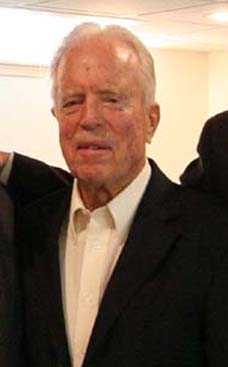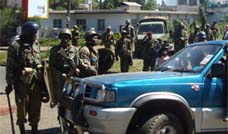
As Whittemore talks about Africa, he speaks of its influence on American culture, how "rap is born out of the oral tradition of Africa through the Jazz age" and how the role of children in African society is so very different from their role here. Almost from the time they can walk, African children are contributing to their family, said Whittemore. They either work or are Advertisement watching their younger siblings who are too young to work, he said, adding that the role of the child comes through in African films. "In African cinema the child is always portrayed as a person, not as an artifact but as a real person," he said. Whittemore said the films shown at the festival are chosen in part due to geography. "I want it to reflect the continent as a whole," he said, noting that he also chooses films that deal with current issues besetting Africa and the world. In the '90s, the festival featured several films on apartheid South Africa. This year, a film that Whittemore says is attracting a lot of notice is "Shake Hands with the Devil: The Journey of Romeo Dallaire." The documentary follows Romeo Dallaire, the commander of the U.N. peacekeeping force stationed in Rwanda during the 1994 genocide, as he returns 10 years later, haunted by memories and moved to become a crusader for multilateral peacekeeping.
Sengal RPCV Dr. Robert Whittemore started the WestConn African Film Festival in the mid-1990s
African Film Festival returning to WestConn
By Erik Ofgang CONTRIBUTING WRITER
Article Last Updated: 02/04/2008 09:10:18 AM EST
DANBURY -- As a young man, Dr. Robert Whittemore spent more than five years in West Africa, first as a member of the Peace Corps and later as an anthropologist doing field research. What he saw and experienced there changed his life.
To teach others about the wonders, mysteries and tragedies of that continent, Whittemore, an anthropology professor at Western Connecticut State University, started the WestConn African Film Festival in the mid-1990s. The 12th annual festival will take place Wednesday through Feb. 29, as part of Black History Month activities at WestConn.
The festival will feature four films this year from contemporary filmmakers: "Forgiveness," "Shake Hands with the Devil: The Journey of Romeo Dallaire," "Witches in Exile" and "Umgig." The films have earned an array of honors, including human rights, audience and best film awards at notable international film festivals. They will be screened multiple times in the Student Center Theater on the university's Midtown campus, 181 White St.
Showings are free and open to the public. Each screening is followed by an open discussion.
As Whittemore talks about Africa, he speaks of its influence on American culture, how "rap is born out of the oral tradition of Africa through the Jazz age" and how the role of children in African society is so very different from their role here.
Almost from the time they can walk, African children are contributing to their family, said Whittemore. They either work or are
Advertisement
watching their younger siblings who are too young to work, he said, adding that the role of the child comes through in African films.
"In African cinema the child is always portrayed as a person, not as an artifact but as a real person," he said.
Whittemore said the films shown at the festival are chosen in part due to geography.
"I want it to reflect the continent as a whole," he said, noting that he also chooses films that deal with current issues besetting Africa and the world.
In the '90s, the festival featured several films on apartheid South Africa. This year, a film that Whittemore says is attracting a lot of notice is "Shake Hands with the Devil: The Journey of Romeo Dallaire." The documentary follows Romeo Dallaire, the commander of the U.N. peacekeeping force stationed in Rwanda during the 1994 genocide, as he returns 10 years later, haunted by memories and moved to become a crusader for multilateral peacekeeping.
Thanks to funds provided by various university organizations, Whittemore buys four to five films for the festival each year from companies that distribute them on a limited basis to universities and schools. He's amassed more than 60 films in the African film collection, some of which will be available from the WestConn library and any of which are always available to borrow from Whittemore.
When he started the festival, Whittemore said it was not just for WestConn students but for all members of the Danbury community. Although attendance numbers have varied in the past, Whittemore said the festival has gained a following over the years.
"When I proposed doing an African film festival, my colleagues said no one would come," he said.
But now he regularly gets phone calls from people asking when the festival will be.
"People in the community have began to expect it," he said.
And as the audience has increased the content of the discussion after the screenings has also improved, said Whittemore.
He said that over the years natives of various African countries have attended, as have former diplomats and members of the military and Peace Corps. They have discussed similarities between the films shown and their experiences in Africa. In addition, the general public has become more knowledgeable and interested, he said.
"People are much more worldly about Africa then they were 12 years ago," he said. "There's genuine interest that extends beyond it being a curiosity."
n
For more information, call the WestConn Office of University Relations at (203) 837-8486 or visit http://www.wcsu.edu.










